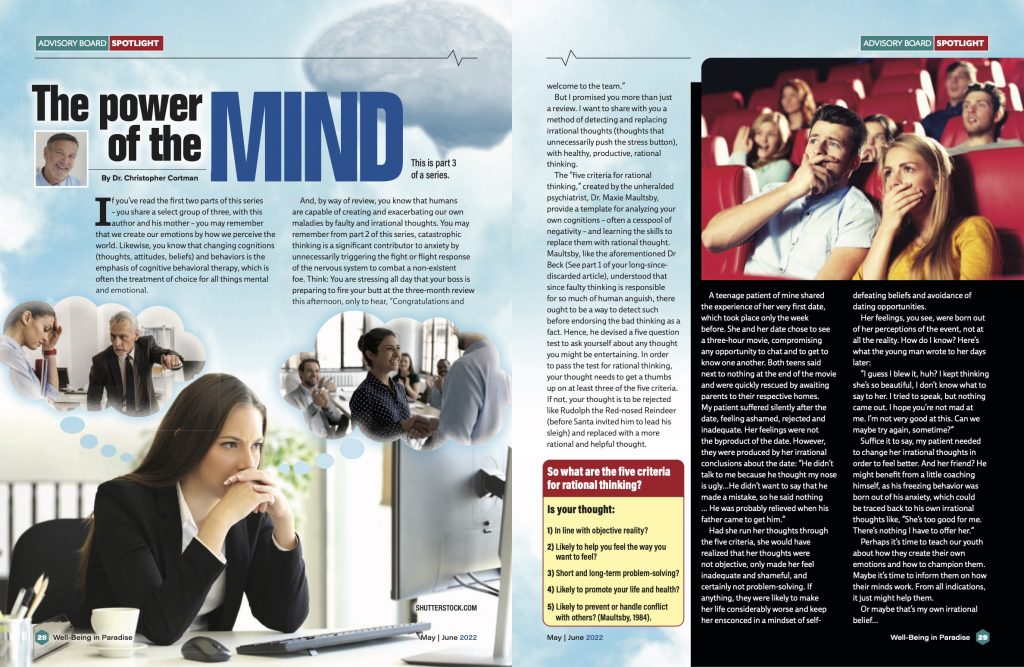Article written for the Venice Gondolier’s Well Being in Paradise Magazine | May/June 2022
If you’ve read the first two parts of this article – you share a select group of three, with this author and his mother – you may remember that we create our emotions by how we perceive the world. Likewise, you know that changing cognitions (thoughts, attitudes, beliefs) and behaviors is the emphasis of cognitive behavioral therapy (CBT), which is often the treatment of choice for all things mental and emotional. And, by way of review, you know that humans are capable of creating and exacerbating our own maladies by faulty and irrational thoughts. In part two of this article, you may remember that catastrophic thinking is a significant contributor to anxiety by unnecessarily triggering the fight or flight response of the nervous system to combat a non-existent foe. Think: you are stressing all day that your boss is preparing to fire your butt at the three month review this afternoon, only to hear, “Congratulations and welcome to the team!”
But I promised you more than just a review. I want to share with you a method of detecting and replacing irrational thoughts (thoughts that unnecessarily push the stress button), with healthy, productive, rational thinking.
The “five criteria for rational thinking“, created by the unheralded psychiatrist, Dr. Maxie Maultsby, provide a template for analyzing your own cognitions, often a cesspool of negativity, and learning the skills to replace them with rational thought. Maultsby, like the aforementioned Dr Beck (See part one of your long -since -discarded article), understood that since faulty thinking is responsible for so much of human anguish, there ought to be a way to detect such before endorsing the bad thinking as a fact. Hence, he devised a five question test to ask yourself about any thought you might be entertaining. In order to pass the test for rational thinking, your thought needs to get a thumbs up on at least three of the five criteria. If not, your thought is to be rejected like Rudolph the red nose reindeer (before Santa invited him to lead his sleigh) and replaced with a more rational and helpful thought.
So what are the five criteria?
Is your thought:
1) In line with objective reality?
2) Likely to help you feel the way you want to feel?
3) Short and long-term problem-solving?
4)Likely to promote your life and health?
5) Likely to prevent or handle conflict with others? (Maultsby, 1984)
A teenage patient of mine shared the experience of her very first date, which took place only the week before. She and her date chose to see a three hour movie, compromising any opportunity to chat and to get to know one another. Both teens said next to nothing at the end of the movie and were quickly rescued by awaiting parents to their respective homes. My patient suffered silently after the date, feeling ashamed, rejected and inadequate. Her feelings were not the byproduct of the date, however, they were produced by her irrational conclusions about the date: “He didn’t talk to me because he thought my nose is ugly…He didn’t want to say that he made a mistake, so he said nothing…He was probably relieved when his father came to get him.“
Had she run her thoughts through the five criteria, she would have realized that her thoughts were not objective, only made her feel inadequate and shameful, and certainly not problem-solving. If anything, they were likely to make her life considerably worse and keep her ensconced in a mindset of self-defeating beliefs and avoidance of dating opportunities.
Her feelings, you see, were born out of her perceptions of the event, not at all the reality. How do I know? Here’s what the young man wrote to her days later:
“I guess I blew it, huh? I kept thinking she’s so beautiful, I don’t know what to say to her. I tried to speak, but nothing came out. I hope you’re not mad at me. I’m not very good at this. Can we maybe try again, sometime?“
Suffice it to say, my patient needed to change her irrational thoughts in order to feel better. And her friend? He might benefit from a little coaching himself, as his freezing behavior was born out of his anxiety, which could be traced back to his own irrational thoughts like, “She’s too good for me. There’s nothing I have to offer her.“
Perhaps it’s time to teach our youth about how they create their own emotions and how to champion them. Maybe it’s time to inform them on how their minds work. From all indications, it just might help them.
Or maybe that’s my own irrational belief…

